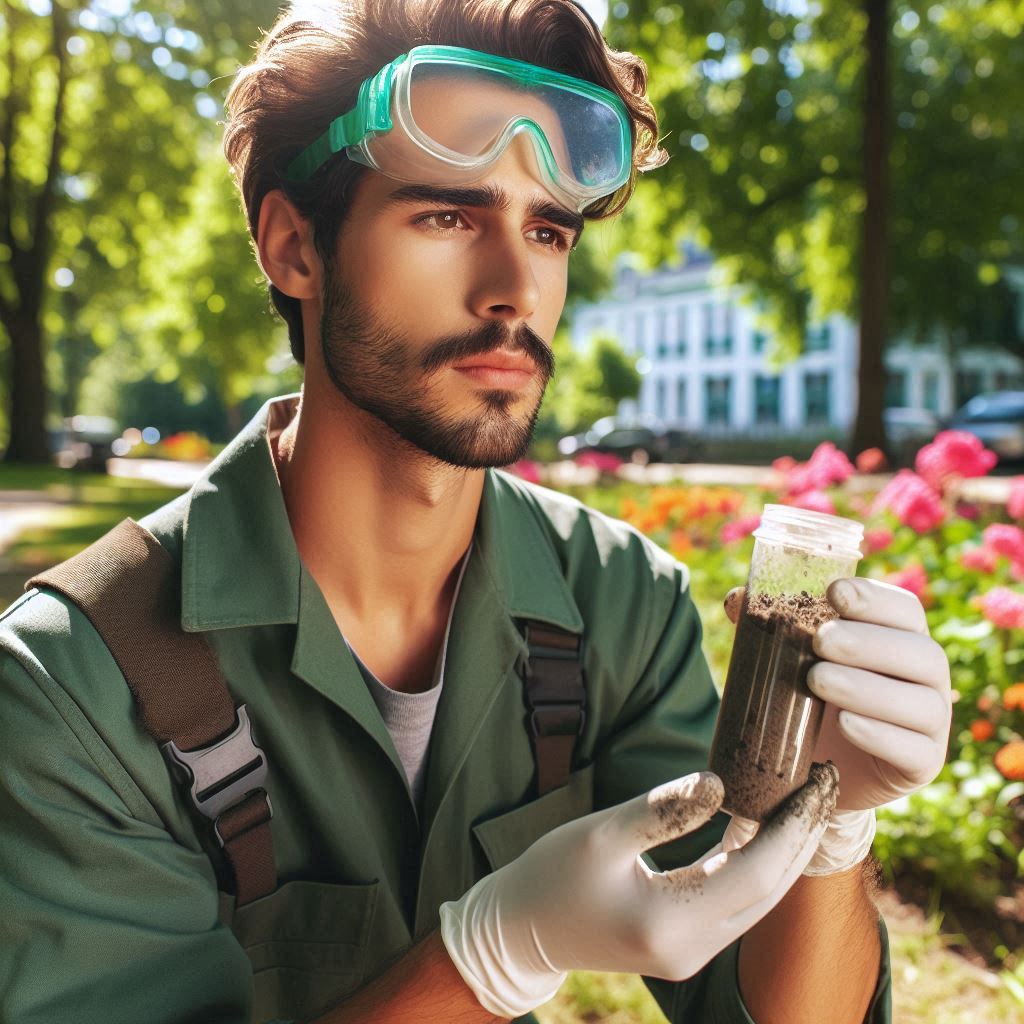Introduction
The Role of an Environmental Technician in Air Quality Monitoring
An environmental technician is essential in air quality monitoring, a field crucial for both public health and environmental protection.
These professionals ensure that air quality data is accurate and reliable, which is vital for assessing pollution levels and implementing effective regulations.
Why Air Quality Monitoring is Important
Air quality monitoring is important because it helps detect and measure pollutants that can negatively impact human health, contribute to climate change, and damage natural ecosystems.
By tracking air quality, we can identify pollution sources, enforce environmental standards, and take proactive steps to improve air conditions.
Accurate monitoring helps in protecting vulnerable populations from health risks and maintaining overall environmental quality.
The Main Responsibilities of an Environmental Technician in This Field
Environmental technicians are tasked with installing, maintaining, and calibrating air quality monitoring equipment.
They collect and analyze air samples to measure pollutant levels, interpret the data, and report their findings.
Their work ensures that air quality measurements are precise and reliable, supporting effective environmental policies and pollution control efforts.
Qualifications and Training
The Educational Requirements to Become an Environmental Technician
To start a career as an environmental technician, a solid educational foundation is essential.
Most employers require at least an associate degree in environmental science, biology, or a related field.
For more advanced positions, a bachelor‘s degree might be necessary.
Relevant coursework should include subjects such as chemistry, environmental science, and data analysis.
This educational background provides the fundamental knowledge needed for effective air quality monitoring and environmental assessments.
Specialized Training or Certifications That May Be Necessary
Specialized training and certifications significantly enhance an environmental technician’s qualifications.
Many technicians obtain certification from professional organizations like the National Environmental Health Association (NEHA).
To earn certifications such as the Certified Environmental Technician (CET) credential, candidates must pass exams and have relevant work experience.
Such certifications not only validate expertise but also improve job prospects and career advancement opportunities.
Additionally, hands-on training with monitoring equipment and fieldwork experience is crucial for mastering the technical aspects of the role.
The Skills and Qualities Needed to Excel in This Role
Excelling as an environmental technician requires a combination of technical skills and personal qualities.
Proficiency with air quality monitoring equipment, including sensors and analyzers, is essential.
Technicians must be adept at calibrating and maintaining these instruments.
Strong analytical skills are crucial for interpreting complex data and generating accurate reports.
Attention to detail ensures precise measurements and data integrity.
Problem-solving skills help address equipment issues or data anomalies effectively.
Good communication skills are necessary for explaining findings to stakeholders and writing clear, comprehensive reports.
A thorough understanding of environmental regulations is important for ensuring compliance with local, state, and federal guidelines.
Physical stamina is also required, as technicians may work outdoors in various weather conditions and handle equipment.
Being adaptable and resilient contributes to success in diverse and sometimes challenging environments.
Finally, a commitment to continuous learning is beneficial.
Technological advancements and regulatory changes necessitate ongoing education.
Pursuing additional certifications or attending workshops helps technicians stay updated and enhance their expertise.
This proactive approach to learning supports career growth and ensures technicians remain effective in their roles.
Essentially, a combination of relevant education, specialized training, and key skills ensures success as an environmental technician.
By meeting these requirements and continually developing their expertise, technicians can effectively contribute to air quality monitoring and environmental protection.
Read: Day in the Life of a CAD Technician
Responsibilities of an Environmental Technician
The Specific Duties and Tasks Involved in Air Quality Monitoring
Environmental technicians play a crucial role in air quality monitoring by carrying out various essential tasks.
Their primary responsibility is to collect air samples from different locations to measure pollutants and other atmospheric components.
They perform regular site inspections to ensure equipment is functioning correctly and calibrate instruments as needed.
Technicians analyze collected samples using specialized equipment and interpret the results to assess air quality levels.
They also prepare detailed reports based on their findings, highlighting any areas of concern.
Additionally, technicians may be involved in investigating sources of pollution and recommending corrective measures.
The Different Methods and Tools Used for Monitoring Air Quality
Several methods and tools are employed in air quality monitoring to ensure accurate and reliable data.
Technicians use air sampling devices, such as pumps and filters, to collect particulate matter from the air.
Gas analyzers measure concentrations of specific pollutants, including nitrogen dioxide, sulfur dioxide, and carbon monoxide.
Advanced equipment like Fourier-transform infrared (FTIR) spectrometers can identify and quantify various gases with high precision.
Technicians also utilize real-time monitoring systems that provide continuous data on air quality parameters.
These tools enable them to track trends and detect any sudden changes in air quality.
How Environmental Technicians Contribute to Maintaining Safe and Healthy Environments
Environmental technicians play a vital role in maintaining safe and healthy environments through their air quality monitoring efforts.
By accurately measuring pollutant levels, they help identify sources of air contamination and assess the effectiveness of air quality regulations.
Their data supports environmental agencies and organizations in making informed decisions to improve air quality standards.
Technicians also help ensure compliance with legal requirements by monitoring and reporting any violations of air quality regulations.
Their work directly contributes to public health by identifying and addressing air quality issues that could pose risks to the community.
By maintaining accurate records and providing actionable insights, they support efforts to create cleaner, safer environments for everyone.
All in all, environmental technicians are integral to air quality monitoring through their comprehensive duties, use of specialized tools, and significant contributions to environmental and public health.
Their meticulous work helps safeguard air quality and promotes a healthier, safer environment.
Read: CAD Technician Salary: What to Expect in the USA
Importance of Air Quality Monitoring
Background Information on the Impact of Poor Air Quality on Human Health and the Environment
Poor air quality poses significant risks to both human health and the environment.
Exposure to pollutants such as particulate matter (PM), nitrogen dioxide (NO2), and sulfur dioxide (SO2) can lead to respiratory problems, cardiovascular diseases, and aggravate existing conditions like asthma.
Long-term exposure is linked to chronic health issues and can reduce overall life expectancy.
Additionally, air pollution affects vulnerable populations, including children, the elderly, and those with pre-existing health conditions.
The environment suffers from poor air quality as well.
Pollutants can damage vegetation, leading to reduced crop yields and harm to forests.
Acid rain, caused by pollutants like sulfur dioxide, can degrade water bodies and soil, impacting ecosystems and biodiversity.
Moreover, pollutants contribute to climate change by increasing greenhouse gases in the atmosphere, leading to global warming and its associated consequences.
The Role of Environmental Technicians in Preventing and Addressing Air Pollution
Environmental technicians play a crucial role in both preventing and addressing air pollution.
They conduct regular air quality assessments to identify pollution sources and track changes over time.
By collecting and analyzing air samples, technicians provide valuable data that helps pinpoint areas with poor air quality.
This information is essential for developing and implementing strategies to reduce emissions and improve air quality.
Technicians also support regulatory compliance by monitoring air pollution levels and ensuring that industrial and vehicle emissions meet established standards.
They may work with regulatory agencies to address violations and recommend corrective actions to mitigate pollution.
Their fieldwork and data collection efforts contribute to creating more effective pollution control measures and environmental policies.
The Significance of Monitoring Air Quality for Regulatory Compliance and Public Safety
Monitoring air quality is vital for regulatory compliance and ensuring public safety.
Regulatory agencies rely on accurate air quality data to enforce environmental laws and standards.
Regular monitoring helps verify that industries and vehicles adhere to emission limits and other regulations designed to protect air quality.
Moreover, continuous air quality assessments help identify emerging pollution problems and assess the effectiveness of existing regulations.
This proactive approach allows for timely interventions to prevent health crises and environmental damage.
Public health advisories based on air quality data inform communities about potential health risks and precautionary measures.
Most importantly, air quality monitoring is essential for understanding and mitigating the impacts of air pollution.
Environmental technicians play a key role in providing the data necessary for effective pollution control and regulatory compliance.
Their work helps safeguard human health, protect the environment, and ensure public safety by maintaining and improving air quality standards.
Read: Surveying and Mapping Technician Internships: A Guide

Challenges and Opportunities
Some of the Challenges Faced by Environmental Technicians in Air Quality Monitoring
Environmental technicians encounter several challenges in air quality monitoring.
One significant challenge is dealing with the variability of air pollutants.
Pollutant levels can fluctuate due to factors like weather conditions, traffic patterns, and industrial activities, making it difficult to obtain consistent and accurate data.
Technicians must account for these variations and ensure their measurements are representative.
Another challenge is the complexity and cost of monitoring equipment.
Advanced air quality monitoring instruments can be expensive and require regular maintenance and calibration.
Technicians must be skilled in managing and troubleshooting these sophisticated tools, which can be both time-consuming and costly.
Technicians also face the challenge of interpreting large volumes of data.
Analyzing complex data sets to identify trends and draw meaningful conclusions requires strong analytical skills and attention to detail.
Additionally, communicating technical findings to non-experts in a clear and understandable manner can be difficult but is essential for informing policy and public awareness.
Potential Opportunities for Growth and Advancement in This Field
Despite these challenges, there are numerous opportunities for growth and advancement in the field of air quality monitoring.
With increasing concerns about environmental pollution and climate change, the demand for skilled environmental technicians is rising.
This growing demand opens up opportunities for career advancement and specialization.
Technicians can pursue advanced certifications or further education to specialize in areas such as industrial hygiene, environmental health, or climate science.
These specializations can lead to roles with greater responsibility or focus on specific aspects of air quality management.
Additionally, there are opportunities to move into leadership or managerial positions within environmental agencies or private firms.
Technicians with strong project management skills and experience may advance to roles overseeing larger teams or managing comprehensive air quality monitoring programs.
How Advancements in Technology Are Shaping the Role of Environmental Technicians
Advancements in technology are significantly shaping the role of environmental technicians.
New technologies are enhancing the accuracy and efficiency of air quality monitoring.
For example, portable sensors and real-time data collection devices allow technicians to gather more immediate and precise information about air pollutants.
These innovations enable quicker responses to pollution events and more dynamic data analysis.
Emerging technologies, such as artificial intelligence (AI) and machine learning, are also transforming the field.
AI algorithms can analyze complex data sets more effectively, identifying patterns and predicting pollution trends with greater accuracy.
This helps technicians make more informed decisions and develop targeted strategies for improving air quality.
Additionally, advancements in remote sensing technologies, such as satellite-based monitoring, provide broader and more comprehensive data on air quality.
This technology allows for large-scale monitoring and enhances the ability to track pollutants across different regions.
In short, while environmental technicians face challenges in air quality monitoring, such as variable pollutant levels and complex data analysis, there are significant opportunities for growth and advancement.
Technological advancements are continuously improving monitoring methods and expanding the role of technicians, making it an exciting and evolving field with promising prospects.
Read: Top Surveying and Mapping Technician Employers
Collaboration and Communication
The Importance of Working Collaboratively with Other Professionals in the Field
Collaboration is crucial for environmental technicians in air quality monitoring.
Working together with other professionals, such as environmental scientists, engineers, and regulatory officials, ensures a comprehensive approach to managing air quality.
Each expert brings unique skills and perspectives, enhancing the overall effectiveness of monitoring efforts.
For instance, environmental scientists provide insights into the sources and impacts of pollutants, which helps technicians understand the broader context of their data.
Engineers can assist in designing and maintaining advanced monitoring equipment, ensuring that it operates efficiently and accurately.
Regulatory officials contribute by setting standards and guidelines that technicians must adhere to, ensuring compliance with environmental laws.
Effective collaboration also facilitates information sharing and coordination, which is vital for addressing complex air quality issues.
By working as a team, professionals can develop more effective strategies for pollution control and mitigation, leading to better outcomes for both public health and the environment.
Transform Your Career Today
Unlock a personalized career strategy that drives real results. Get tailored advice and a roadmap designed just for you.
Start NowHow Environmental Technicians Communicate Findings and Recommendations to Stakeholders
Environmental technicians play a key role in communicating their findings and recommendations to stakeholders.
Clear and effective communication is essential for ensuring that data is understood and acted upon appropriately.
Technicians prepare detailed reports that summarize air quality measurements, identify potential issues, and offer recommendations for improvement.
When communicating with regulatory agencies, technicians provide evidence-based reports that support compliance with environmental regulations.
These reports may include data analysis, trends, and any violations of air quality standards.
For the general public, technicians must present information in a way that is accessible and understandable, often through summaries or public advisories.
In meetings with policy makers, technicians offer technical insights and recommendations that help shape environmental policies and regulations.
They must be able to explain complex data and technical concepts in a manner that informs decision-making processes.
The Role of Teamwork in Ensuring Effective Air Quality Monitoring Practices
Teamwork is integral to ensuring effective air quality monitoring practices.
Collaborating with colleagues and professionals from different disciplines enhances the accuracy and reliability of monitoring efforts.
Technicians often work in teams to conduct field assessments, operate and maintain equipment, and analyze data.
Team members support each other by sharing expertise and resources, which improves problem-solving and efficiency.
For example, a team might work together to troubleshoot equipment issues, design better sampling strategies, or develop comprehensive reports.
This collective effort leads to more thorough and accurate assessments of air quality.
Effective teamwork also fosters a culture of continuous improvement.
Team members can share best practices, learn from each other‘s experiences, and implement new techniques or technologies collaboratively.
This collective approach helps to address challenges more effectively and ensures that monitoring practices remain up-to-date and robust.
In summary, collaboration and communication are essential components of successful air quality monitoring.
Environmental technicians must work closely with other professionals, clearly communicate their findings and recommendations, and embrace teamwork to ensure effective and comprehensive monitoring practices.
By doing so, they contribute to more accurate assessments, better regulatory compliance, and ultimately, a healthier environment.
Case Studies and Success Stories
Real-Life Examples of Environmental Technicians Making a Positive Impact in Air Quality Monitoring
One notable example of environmental technicians making a positive impact is the work done in Los Angeles, California, to combat smog.
Los Angeles has long struggled with air pollution, primarily from vehicle emissions.
Environmental technicians played a crucial role in monitoring air quality and identifying pollution hotspots.
Their data helped inform local policies, leading to stricter emissions standards for vehicles.
This collaborative effort resulted in a significant reduction in smog levels over the years, demonstrating how effective monitoring and targeted interventions can improve urban air quality.
Another inspiring case is the monitoring program implemented in Beijing, China, to address severe air pollution issues.
Environmental technicians deployed a network of air quality sensors throughout the city to provide real-time data on pollution levels.
This data was crucial for implementing emergency measures, such as temporary restrictions on industrial activities and vehicle use during high pollution episodes.
The program‘s success in reducing harmful air pollutants has been a model for other cities facing similar challenges.
Success Stories and Achievements in the Field
One success story is the initiative undertaken by the Environmental Protection Agency (EPA) in the United States to improve air quality in various regions through the National Ambient Air Quality Standards (NAAQS) program.
Environmental technicians contributed significantly to this initiative by collecting data, monitoring pollutants, and assessing compliance with air quality standards.
Their work led to successful interventions that improved air quality in several areas, demonstrating the impact of rigorous monitoring and regulatory enforcement.
Another achievement can be seen in the work of the European Union’s European Air Quality Index (EAQI) project.
Environmental technicians across Europe have been involved in gathering data and analyzing air quality across the continent.
The EAQI project has provided valuable information to the public and policymakers, leading to better-informed decisions and improved air quality management strategies across member states.
The Difference That Environmental Technicians Can Make in Protecting Our Environment
The efforts of environmental technicians often lead to profound and tangible improvements in air quality and public health.
Their work not only helps identify pollution sources and enforce regulations but also contributes to broader environmental and public health goals.
For instance, the monitoring and data analysis done by technicians have played a key role in reducing the incidence of respiratory diseases linked to air pollution, showcasing the direct impact of their work on community well-being.
In communities where technicians have implemented air quality monitoring programs, residents have experienced clearer skies and healthier living conditions.
The success stories of improved air quality in cities like Los Angeles and Beijing highlight how dedicated professionals can drive meaningful change.
These achievements inspire confidence in the field and emphasize the importance of environmental technicians in protecting our environment.
By showcasing these real-life examples and success stories, we can appreciate the vital role environmental technicians play in safeguarding air quality.
Their commitment to monitoring, analyzing, and addressing air pollution directly benefits public health and the environment, making a significant difference in the world.
See Related Content: Freelance Cybersecurity Analyst: Pros and Cons
Gain More Insights: Best Colleges for Computer Engineering Degrees
Conclusion
The Key Points Discussed in the Blog Post
Environmental technicians are central to air quality monitoring.
They handle the installation, maintenance, and calibration of air quality equipment, ensuring precise data collection.
Their analysis of air samples helps in identifying pollution sources and recommending effective strategies to mitigate environmental impact.
Accurate monitoring is crucial for enforcing air quality standards and protecting public health.
The Crucial Role of Environmental Technicians in Air Quality Monitoring
Environmental technicians play an indispensable role in safeguarding air quality.
Their technical skills and dedication ensure that air quality measurements are accurate and reliable.
They provide critical data that informs regulations and public health decisions, making their work essential for maintaining a healthy environment.
Consider Pursuing a Career as an Environmental Technician
For those interested in environmental protection, a career as an environmental technician offers a meaningful and impactful opportunity.
Dive into this field to discover how you can contribute to cleaner air and a healthier planet.
If you‘re passionate about making a difference, consider exploring this career path and becoming part of a vital workforce dedicated to environmental health.
[E-Books for Sale]
The Big Book of 500 High-Paying Jobs in America: Unlock Your Earning Potential
$19.99 • 500 High-Paying Jobs • 330 pages
Explore 500 high-paying jobs in America and learn how to boost your career, earn more, and achieve success!
See All 500 High-Paying Jobs of this E-Book
1001 Professions Without a Degree: High-Paying American Jobs You Can Start Now
$19.99 • 1001 Professions Without a Degree • 174 pages
Discover 1001 high-paying jobs without a degree! Unlock career tips, skills, and success strategies for just $19.99!




